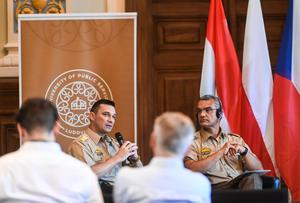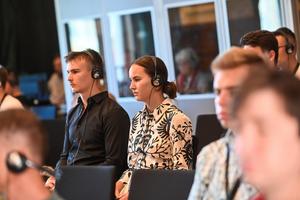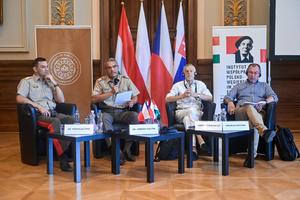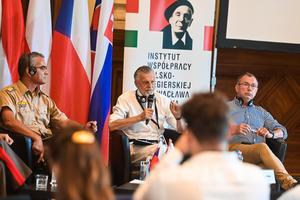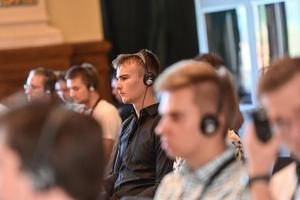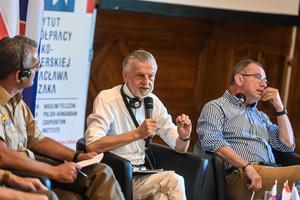The closing event of the three-day Visegrád Summer Academy focused on security policy, defence, and foreign policy strategy at the Ludovika University of Public Service (LUPS) on August 27th. In addition, participants had the opportunity to learn about the results of public opinion surveys regarding Hungarian-Polish relations and listen to expert opinions on events in Ukraine and prospects.
Imre Porkoláb, a brigadier general responsible for defence innovation, highlighted the need for strategic foresight in defence due to the ineffectiveness of previous methods, particularly in procurement. Speaking at the closing panel discussion of the Visegrád Summer Academy, moderated by Colonel Zoltán Jobbágy, Vice-Dean for International Affairs of LUPS’s Faculty of Military Sciences and leader of the Department of Military Strategy, Porkoláb stressed the importance of strategic cooperation with the Visegrád Group (V4) and NATO in the fields of security, defence, and foreign policy. He mentioned that the current situation requires faster task execution, leading to increased support for small and medium-sized enterprises and the acquisition of dual-use technologies and tools that can be utilised in agriculture and the military. He highlighted the significance of the European Defense Fund, which provides a seven-year opportunity for nations to collaborate and develop shared resources to enhance Europe's defence with a budget of around seven billion euros. He explained that the Defense Innovation Research Institute in Hungary coordinates this effort. He expressed his disappointment that the European Union does not allow domestic model-changing universities to participate in this program.
Porkoláb also mentioned that Hungary began modernising its military equipment in 2016, even though relative calm prevailed. Outdated Russian military technology is being continuously replaced with state-of-the-art French and German equipment, with a strong emphasis on their maintenance. He noted that the current acquisitions result from the new strategy. While Hungary had to start from a much larger disadvantage than other countries, significant progress has been made. He also discussed the development of the defence industry, which has economic and national security implications, underlining the importance of the Rheinmetall factory established in Hungary. He addressed the influence of artificial intelligence and digital technologies on defence, cybersecurity, and information warfare. Regarding defence innovation, he emphasised that Hungary has exceeded research and development expectations for years, and everyone must contribute to the nation's defence, necessitating collaboration.
Andrzej Zybertowicz, a sociologist and analyst who has served as an advisor to the Polish President for eight years, stated that Poland aims to support the principle of subsidiarity, as the European Union's monolithic development is ineffective. Therefore, Poland supports the Three Seas Initiative, proposed by Poland in 2016 and primarily aims to enhance economic cooperation between 12 EU countries around the Adriatic, Baltic, and Black Seas. He argued that Germany could not guarantee stability and security within the Union and that the United States should reconsider its security policy. Given the complex situation in Ukraine, he noted that Poland has been spending the most on defence since the communist era and began procurement, similar to Hungary, well before the outbreak of war.
Andrzej Zybertowicz, who also deals with the challenges of artificial intelligence, highlighted that it is conceivable that the currently used tools will become completely ineffective against artificial intelligence.
Jaroslav Kuchyna, an analyst at the Czech Cevro Institute, discussed how the perception of security changed in the Czech Republic due to the ongoing conflict in Ukraine. The Czech government initiated a dialogue with its citizens on security to make them understand that they must contribute to their defence. He also mentioned that threats such as pandemics and migration are relevant apart from the war.
Following the roundtable discussion, Arkadiusz Adamczyk from the Warsaw-based Wacław Felczak Polish-Hungarian Cooperation Institute, Csaba Faragó from the Századvég Foundation, and Mihály Rosonczy-Kovács from the Nézőpont Institute discussed political, cultural, and other relations between Hungary and Poland based on public opinion surveys. Experts emphasised that there is no fundamental difference between the Hungarian and Polish viewpoints; both countries condemn Russian aggression and are interested in a sovereign and free Ukraine.
After the holy mass celebrated by Franciscan monk Pawel Cebula, a panel discussion on Ukraine and the region's future was led by Gábor Csizmazia. In his introduction, he referred to Polish writer Oscar Haleczki and Czech writer Milan Kundera. He also highlighted the characteristics of Central and Eastern Europe.
When the centre of development shifted to the Atlantic region, the Central and Eastern European part was pushed into the background – stated Íjgyártó István, former ambassador to Kyiv, reminding that now the peoples of this region may once again find themselves in a situation of subordination due to great power ambitions, similar to past centuries. According to István Íjgyártó, the conflict in Ukraine is currently "frozen," and it is unclear how Ukraine's situation will evolve after a peace settlement. He pointed out that it is always easier to provide weapons than consistent financial support, which would be necessary to rebuild the country over the next decades for people to see prospects and not migrate abroad.
The region's countries were in a growth phase when the war broke out – emphasised Attila Demkó, head of the Geopolitical Workshop at Mathias Corvinus Collegium (MCC). He believes that one of the causes of the conflict is that one part of the Ukrainian people wants to impose its will on the other. In his view, the region’s fragmentation is because borders were created due to wars, which is why the attitude towards ethnic issues can be the biggest obstacle to progress, and Russia exploits these divisions. Attila Demkó reminded us that Hungary's GDP is proportionally in the middle range of Europe, yet it provided significant support to Ukraine when the war broke out. He added that Hungary used to supply weapons as well. Still, after the 2017 education and language law, the country felt that Ukraine was acting as a great power against Hungary, which led to the discontinuation of such support.
Despite all circumstances, efforts should be made to find commonalities rather than divisions, as stressed by Marek Natusiewicz from the Wacław Felczak Polish-Hungarian Cooperation Institute. He emphasized the importance that this war should be the last on both the international and interstate levels. He pointed out that in the city where he lives, there are 600,000 Poles and 300,000 Ukrainians who place great emphasis on their own integration.
He expressed his belief that Poland would mediate between the United States, China, and Ukraine, suggesting that closed-door negotiations between Hungary and Poland would be beneficial due to their high levels of political experience.
The event also included a cultural segment where attendees had the chance to become acquainted with Géza Pörös's book "Hamvak és gyémántok" (Ashes and Diamonds) in a conversation with film critic László Kelecsényi. The event concluded with a horse show at the Ludovika Hussar Riding Arena.
Text: Réka Zsuzsanna Szabó
Photo: Dénes Szilágyi
